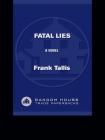Fatal Lies Frank Tallis (best fiction books to read txt) 📖

- Author: Frank Tallis
Book online «Fatal Lies Frank Tallis (best fiction books to read txt) 📖». Author Frank Tallis
“Perhaps you will be able to communicate your intentions better next time? You will be more accustomed to Rosé—and less anxious, no doubt.”
Trezska took his hand and squeezed it affectionately—an expression of gratitude for his solicitous remarks.
The waiter returned and deposited Trezska's order, along with a carafe of water, on their table. She reached out and turned the bottle so she could examine the label. It showed an eighteenth-century dandy in a striped jacket and Napoleonic hat being approached by a flower girl. The legend read JULES PERNOD, AVIGNON.
Liebermann asked Trezska about Rosé's teaching practices, and then indulged in a little musical gossip.
“Did you see his wife?”
“No.”
“She is Director Mahler's sister. They married only last year. In fact, the day after the director himself got married. They say that when Rosé was at Bayreuth, the orchestra lost their way in the middle of Die Walküre. He stood up and with great skill managed to get them all playing together again. Mahler was in the audience and is supposed to have exclaimed—‘Now, that's what I call a concertmaster!’ “
“How is it that you know so much about Rosé?” asked Trezska, a line of perplexity appearing across her forehead.
“This is Vienna,” said Liebermann—as if no further explanation were necessary.
Trezska lifted the bottle and poured a small quantity of absinthe into two tall glasses. The liquor shimmered. It was translucent, like melted emeralds.
“Watering absinthe is something of an art,” said Trezska. “One must conduct the ritual with the same reverence that the Oriental peoples reserve for their tea ceremonies.”
She picked up a miniature perforated trowel and balanced it across the rim of her glass. Taking a lump of sugar from the bowl, she placed it on the pinholes. Then, tilting the carafe, she allowed a weak, twisting trickle of water to douse the sugar. The white crystals dissolved, and opaque droplets fell into the glass, turning the elixir a milky green. After a few moments, the absinthe became magically opalescent. It seemed to emit a pale glow, like the mysterious light of fireflies. The air filled with a redolence that was difficult to describe— a sickly bouquet with coppery traces.
“How long have you been drinking absinthe?” Liebermann asked.
“Oh, for some time now: I first became partial to the green fairy‘s charms while I was studying in Paris.”
“Yes, it is something of an institution there, I understand.”
“More than that—a religion.”
Trezska maintained the steady flow of water.
“You know,” said Liebermann, “I once read a monograph by the distinguished Parisian physician Dr. Valentin Magnan, of the asylum of Sainte-Anne. In it, he identified a specific neurological condition that he styled ‘absinthe epilepsy’ Magnan contends that absinthe can affect the motor centers of the cerebellum and the paracerebellar nuclei, producing convulsions and hallucinations of sight and hearing.”
“It is also the inspiration of poets,” said Trezska, “the favored spirit of visionaries, and an extremely potent aphrodisiac.”
Their eyes met. Liebermann smiled and pushed his glass toward her.
“You doctors,” she said, watering the second absinthe. “You seem to find fault with everything. You'll be saying that smoking is bad for you next.”
Liebermann drew on his cigar. “Well, I must admit, it has been suggested… but that can't be true.”
“How is it cured, this absinthe epilepsy?”
“Magnan recommends long cold baths—up to five hours—and purges of Sedlitz water.”
“In which case, I would rather suffer from the illness than endure its treatment! Prost!“
They lifted their glasses and touched them together. The controlled, gentle collision produced a low-pitched clunk. Liebermann took a tentative sip and savored the unusual flavor.
First, a strong impression of anise, but then the arrival of other registers, seeping out slowly, teasing the palate—a suggestion of mint, a tarry undercurrent of licorice…. After he had swallowed the absinthe and it had numbed the back of his throat, he became aware of an unpleasant medicinal aftertaste—as if an iron button had been dissolving in the saliva beneath his tongue.
“Well?” asked Trezska. “What do you think?”
“Interesting—”
“Any hallucinations?”
“No, but I can well believe a sufficient quantity might induce them!”
“It happened to me once,” said Trezska nonchalantly. “I was sitting in a café on the Place Pigalle. I had been drinking with friends and fell into a kind of stupor.… I felt a summer breeze on my face and heard the sound of a brook. The sun shone down on my closed eyes.… It was all very vivid—and seemed to last forever.… When I was finally roused, I collected my things together and walked toward the door. Yet I could still feel the heavy heads of flowers brushing against my skirt.”
She turned to face Liebermann. Her expression was shadowed with dark sensuality. The absinthe glistened on her lips—an enticement that he was simply unable to resist. Liebermann leaned forward and kissed her. When they drew apart, she smiled and, taking his hand, locked her fingers between his.
Liebermann could now see why Trezska had been so insistent that they meet in Zielinski's. It was the kind of establishment where a couple could become quite intimate without attracting much attention.
Trezska asked Liebermann about his work at the hospital, and he told her about the deluded jurist who claimed to be in conversation with an angelic being from Phobos. She listened intently and, after he had finished, said: “But how can you be sure that this old man is deluded?” Then they embarked on a philosophical discussion about the nature of reality, a conversation that became less and less coherent as they imbibed larger quantities of absinthe.
Liebermann gazed out into the coffeehouse through a dense pall of cigarette and cigar smoke. The clientele of Zielinski's was comprised of workmen, artists, and a few women whose abundant cleavages and raucous laughter declared their profession. Music was provided by a zither player: an unkempt gentleman with an eye-patch and wild white hair. He plucked an itinerant melody that at





Comments (0)